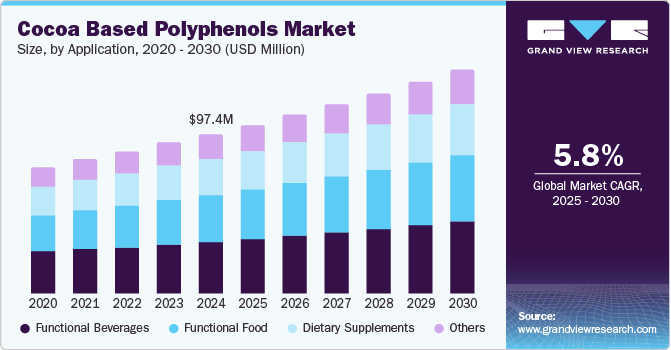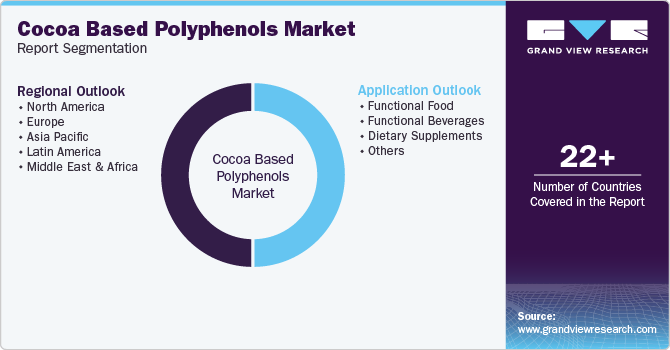
Cocoa Based Polyphenols Market Size, Share & Trends Analysis Report By Application (Functional Foods, Functional Beverages, Dietary Supplements), By Region (Asia Pacific, North America), And Segment Forecasts, 2025 - 2030
- Report ID: GVR-4-68039-946-7
- Number of Report Pages: 150
- Format: PDF
- Historical Range: 2018 - 2023
- Forecast Period: 2025 - 2030
- Industry: Specialty & Chemicals
Cocoa Based Polyphenols Market Trends
The global cocoa based polyphenols market size was valued at USD 97.4 million in 2024 and is expected to grow at a CAGR of 5.8% from 2025 to 2030. Polyphenols are phytochemicals and micronutrients with antioxidant properties. These products offer several health benefits associated with preventing cardiovascular diseases, cancer, diabetes, neurodegenerative conditions, aging, and skin-related problems. Polyphenols also have an important prebiotic effect; they increase the ratio of beneficial bacteria in the gut, which is important for overall good health, weight management, and disease prevention.

Cocoa polyphenols are natural compounds found in cocoa beans, known for their antioxidant and anti-inflammatory properties, contributing to overall health. These compounds are gaining popularity due to their potential to combat oxidative stress, a factor implicated in diseases such as cancer and diabetes.
Polyphenols are anticipated to grow primarily in the functional food market. They can be considered functional foods, providing various health benefits beyond basic traditional nutrition. Growing consumer awareness regarding the health benefits of polyphenol consumption is projected to influence industry growth positively. Consumers prefer drinks fortified with vitamins, minerals, probiotics, and other immunity-boosting ingredients. These beverages frequently boast the immune-boosting properties of ingredients such as ginger and turmeric to gain consumers' attention. These factors drive demand for functional foods and beverages that boost immunity. In addition, recent innovations in the industry have proven the benefits of cocoa in dietary supplements due to its high polyphenol content. Consumption of cocoa-based polyphenol-infused supplements helps lower blood pressure and improves insulin sensitivity among users. This, in turn, contributed to the surged demand for cocoa based polyphenols for use in nutritional food or supplements over the past few years.
Furthermore, the demand for cocoa polyphenol-rich products is increasing across several industries due to their potential health benefits. These benefits include protection against cardiovascular diseases, high cholesterol, and diabetes, making them attractive for functional foods, supplements, and beverages. The pharmaceutical industry is also interested in cocoa polyphenols for supplements. Moreover, these compounds are being explored for non-health applications, such as natural food coloring agents and ingredients in toiletries. Regions such as North America and Asia Pacific are witnessing increased consumption of cocoa polyphenols in supplement form, while Japan sees their use in energy drinks.
Application Insights
The functional beverages segment dominated the cocoa-based polyphenols market and accounted for the largest revenue share of 32.9% in 2024. This is attributable to the notable surge in beverage companies designed specifically for cardiovascular protection. Growth in the global functional beverage industry is a major factor driving the market as it provides overall nutrition and well-being to consumers. Moreover, in emerging economies of Asia Pacific and Central and South America, opportunities in the functional foods sector are expected to result from flourishing domestic markets and increasing export possibilities to developed economies of North America, Europe, and Japan.
Functional foods are expected to grow at the fastest CAGR of 6.2% over the forecast period, owing to the hectic lifestyles of people and rising awareness of the health benefits of these nutrient-enriched foods. In addition, functional food offers particular health benefits such as strengthening the immune system, improved mental energy, improved heart health, improved bone health, cholesterol management, and other benefits related to ophthalmology, among others. Furthermore, several government bodies have favorably regulated the functional food products in different regions, resulting in lucrative opportunities for their production and distribution, thereby driving the markets’ growth.
Regional Insights
The North America cocoa based polyphenols market is expected to grow at a CAGR of 6.3% over the forecast period, owing to a growing trend where consumers are actively selecting nutritional supplements and food items that are rich in both vitamins and antioxidants. In addition, key players in the industry are actively exploring the potential applications of cocoa-based polyphenols in a range of packaged food products and beverages. Furthermore, these explorations are expected to expand further the market's reach and influence in the region.

The cocoa-based polyphenols market in the U.S. led the North American market and accounted for the largest revenue share in 2024, driven by rising inclination of consumers towards nutritional supplements and food items rich in vitamins and antioxidants is anticipated to drive sales of cocoa-based polyphenols in North America, particularly the U.S. furthermore, the active engagement of major companies in exploring the potential of cocoa-based polyphenols for use in packaged foods and beverages is also a significant factor. This is expected to increase market expansion in the U.S.
Europe Cocoa Based Polyphenols Market Trends
The Europe cocoa based polyphenols market is expected to grow significantly over the forecast period, owing to the increasing awareness among consumers regarding the various health benefits that are associated with cocoa-based polyphenols. In addition, the growing understanding of these health benefits is expected to propel market growth across the European region further as consumers seek out products that offer such advantages.
Asia Pacific Cocoa Based Polyphenols Market Trends
Asia Pacific cocoa based polyphenols market dominated the global market and accounted for the largest revenue share of 36.1% in 2024. This is attributed to the surging demand for plant-based food products owing to the rising awareness regarding their health benefits among consumers. This key factor is expected to pave the way for cocoa-based polyphenols in terms of value sales in the Asia Pacific region, especially in India, China, Australia, and Indonesia, during the forecasted years.
The cocoa-based polyphenol market in India led the Asia Pacific market and held a significant revenue share in 2024, owing to increased sales in the coming years. This positive trajectory is driven by heightened demand for plant-based food items, reflecting a growing awareness among consumers regarding their associated health advantages. Furthermore, this trend is expected to solidify, effectively driving market growth in India as more people embrace the benefits of plant-derived nutrients.
Key Cocoa Based Polyphenols Company Insights
The market for cocoa based polyphenols is competitive, wherein the competition is highly dependent upon the strategies applied by key market players to gain a competitive edge over others. Key players are constantly developing and expanding their manufacturing units and processes to meet the growing demand for products containing a high concentration of polyphenols. Industry participants have undertaken various strategic initiatives such as production capacity expansion, diversified product portfolios, mergers and acquisitions, and disinvestments to mark their presence in the market. The market is characterized by a few big players, such as ADM, Sabinsa Corporation, Naturex, and Berkem.
-
Kemin Industries manufactures cocoa-based polyphenols while addressing the growing demand from various end-use industries. These include food and beverage, healthcare, personal care, pharmaceuticals, and nutraceuticals. The company contributes to innovations in polyphenol-infused supplements. It also blends antioxidants and acidifiers to maintain the quality of raw materials.
-
Mars, Incorporated caters to the increasing demand from various sectors, especially food and beverage. The company is also introducing new food and beverage solutions using the compound as a food additive. Through these efforts, they contribute to the growing consumer awareness of the health benefits of cocoa-based polyphenols.
Key Cocoa Based Polyphenols Companies:
The following are the leading companies in the cocoa based polyphenols market. These companies collectively hold the largest market share and dictate industry trends.
- ADM
- Barry Callebaut
- Kemin Industries
- Mars, Incorporated
- Naturex S.A
- Nutra Ingredients Limited
- Polyphenols AS
- Ajinomoto NaturalSpecialities
- Sabinsa, BERKEM
- Diana Food
Recent Developments
-
In September 2024, Meiji Co., Ltd. launched (SAVAS) MILK PROTEIN FAT FREE COCOA, a protein drink with 30g of milk protein, the highest in the SAVAS MILK PROTEIN series. It contains vitamins B and D, perfect after a workout. In addition, survey results showed customers wanted improved taste and higher protein content, leading to its development. Meiji leveraged years of research to balance high protein, easy consumption, and great taste.
Cocoa Based Polyphenols Market Report Scope
|
Report Attribute |
Details |
|
Market size value in 2025 |
USD 103.3 million |
|
Revenue forecast in 2030 |
USD 136.8 million |
|
Growth rate |
CAGR of 5.8% from 2025 to 2030 |
|
Base year for estimation |
2024 |
|
Historical data |
2018 - 2023 |
|
Forecast period |
2025 - 2030 |
|
Quantitative units |
Volume in tons, Revenue in USD thousand/million, and CAGR from 2025 to 2030 |
|
Report coverage |
Revenue forecast, company ranking, competitive landscape, growth factors, and trends |
|
Segments covered |
Application, region |
|
Regional scope |
North America, Asia Pacific, Europe, Latin America, Middle East & Africa |
|
Country scope |
U.S., Canada, Mexico, Germany, UK, Italy, France, Spain, China, India, Japan, South Korea, Brazil, Argentina, Saudi Arabia, South Africa |
|
Key companies profiled |
ADM; Barry Callebaut; Kemin Industries; Mars, Incorporated; Naturex S.A; Nutra Ingredients Limited; Polyphenols AS; Ajinomoto NaturalSpecialities; Sabinsa, BERKEM; Diana Food |
|
Customization scope |
Free report customization (equivalent to 8 analyst working days) with purchase. Addition or alteration to country, regional & segment scope. |
|
Pricing and purchase options |
Avail customized purchase options to meet your exact research needs. Explore purchase options |
Global Cocoa Based Polyphenols Market Report Segmentation
This report forecasts revenue growth at global, regional, and country levels and analyzes the latest industry trends in each sub-segment from 2018 to 2030. For this study, Grand View Research has segmented the global cocoa based polyphenols market report based on application, and region:

-
Application Outlook (Volume, Tons; Revenue, USD Thousand, 2018 - 2030)
-
Functional Food
-
Functional Beverages
-
Dietary Supplements
-
Others
-
-
Regional Outlook (Volume, Tons; Revenue, USD Thousand, 2018 - 2030)
-
North America
-
U.S.
-
Canada
-
Mexico
-
-
Europe
-
Germany
-
UK
-
Italy
-
France
-
Spain
-
-
Asia Pacific
-
China
-
India
-
Japan
-
South Korea
-
-
Latin America
-
Brazil
-
Argentina
-
-
Middle East and Africa
-
Saudi Arabia
-
South Africa
-
-
We are committed towards customer satisfaction, and quality service.
"The quality of research they have done for us has been excellent."




